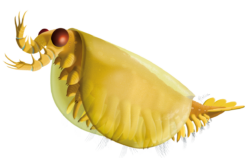Dr. Cédric Aria, Ph.D.
 I am a palaeontologist focusing on the study of fossil arthropods as a source of data to explore macroevolutionary phenomena, especially parallelism/convergence, morpho-functional trends and constraints, and their link with developmental and genetic information. To do so, I mainly use modern imagery techniques, a variety of phylogenetic tools, and multivariate statistics. I also have a salient interest – perceived as a duty – in the history of science, epistemology, and ethics.
I am a palaeontologist focusing on the study of fossil arthropods as a source of data to explore macroevolutionary phenomena, especially parallelism/convergence, morpho-functional trends and constraints, and their link with developmental and genetic information. To do so, I mainly use modern imagery techniques, a variety of phylogenetic tools, and multivariate statistics. I also have a salient interest – perceived as a duty – in the history of science, epistemology, and ethics.
Present role and affiliation
Unaffiliated.
Past affiliations
- Royal Ontario Museum / University of Toronto, Toronto, Canada (2022-2023)
- Northwest University, Xi’an, China (2021)
- Nanjing Institute of Geology and Palaeontology, Nanjing, China (2017 – 2019)
- Royal Ontario Museum / University of Toronto, Toronto, Canada (2012 – 2017)
- University of Bristol, Bristol, United Kingdom (2010 – 2011)
- Museum National d’Histoire Naturelle, Paris, France (2010)
Qualifications
- Ph.D. in Ecology and Evolutionary Biology, University of Toronto, Canada, 2017
Thesis: A reappraisal of early body plan evolution in the Panarthropoda - Master en Paléontologie, Paléobiologie et Phylogénie (M.Sc. in Palaeontology, Palaeobiology and Phylogeny), Université de Montpellier, France, 2010
First Class Honours
Thesis: Étude sur les fourmis (Hymenoptera: Formicidae) de l’ambre sparnacien [Ants of the lowermost Eocene amber of Oise (Parisian basin)] - Licence en Sciences de la Vie et de la Terre (B.Sc. in Geology and Biology), Université de Strasbourg, France, 2008
Main expertise
- Panarthropod morphoanatomy and systematics
- Burgess Shale-type (BST) fossils and preservation: Hands-on observational and analytical experience on hundreds of fossils from the Burgess Shale and BST Chinese Lagerstätten
- Macroevolution
- Multivariate statistics
- Fossil-inclusive phylogenetics
- Remote mountain-based fieldwork leading to excavation – shipment – preparation – storage – exhibition
- Palaeoentomology
